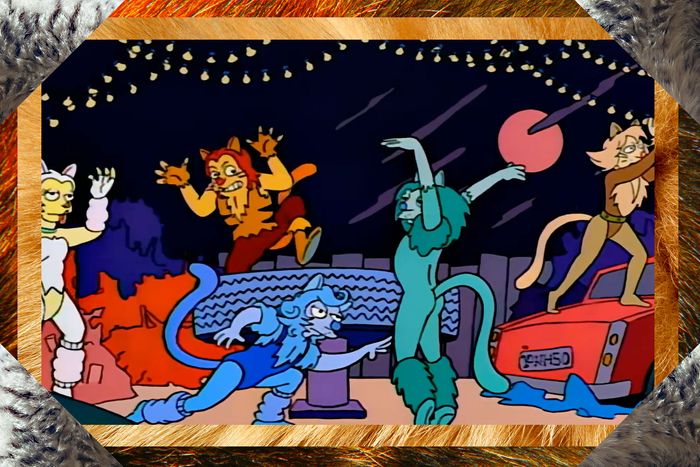
Like it did with so much pop culture, The Simpsons taught me both what Cats was and why I was supposed to hate it. In the 1993 episode “Boy-Scoutz ’n the Hood,” Bart and Milhouse go on a Squishy-induced bender, “Broadway style!” as Milhouse puts it. Set to the On the Town rip-off “Springfield, Springfield,” the boys ride skateboards, chew “Toothless Joe’s” bubblegum, go to an arcade, get temporary tattoos, and … go see Cats. The Cats bit happens in the middle of the musical number and paints a decently accurate picture of the theater production: Surrounded by string lights and giant pieces of trash, five dancers in leg-warmers, cat ears, fingerless gloves, and low-plunging leotards hop around with self-serious expressions and tails coming out of their butts. The yuppie audience behind them looks respectful and placated, but Milhouse and Bart fidget in their seats. When a cat (whom I assume to be Bombalurina) sashays past their seats, Bart hits her with a spitball. Cue the cat-fight sound effects. It’s a great joke if you’re 7 years old and watching The Simpsons: People acting like cats! Ridiculous!
In 1993, Cats was in the midst of its fourth national tour, which ran for over a decade. If the Broadway version was a success (by all metrics, it was), the touring productions were just as big, comprising over 5,000 shows and grossing $400 million. It was a blockbuster, and a confounding one at that, because what could possibly be so appealing to middle American audiences about grown adults in yak-fur leotards throwing up jazz hands? Springfield represents the exact sort of regional market where the Cats tour would be a success, populated by the middling middlebrow taste — pablum! — on which The Simpsons writers room of fresh Lampoon alums liked to dunk. Cats was too horny and too self-serious and and too popular with tourists. Along with Phantom of the Opera, it was credited with ruining Broadway. When Dan McGrath wrote The Simpsons episode, the peak of cool posturing was ironic distancing and armchair criticism. Reality Bites came out during this season of The Simpsons. Singles was the year before. It was cool to punch meow-n.
The show’s next Cats parody came in 2005, during an Itchy and Scratchy sequence. Scratchy goes to see a production of Cats, sits through two bars, calls it boring, and shoots his head off. Textbook stuff for Itchy and Scratchy. This Cats parody is interesting because it gives us a fake song, sung by a blue cat in a studded belt: “Tim Tom Tabby is a curious cat / Went to see the Queen in a velveteen hat.” The takeaways from this bit: Before Book of Mormon and Hamilton, musicals were a much more common signifier for “lameness.” Also, Tim Tom Tabby is just mincing enough to make this joke feel vaguely homophobic, in true aughts dude-bro comedy fashion. We’re in Family Guy territory, here.
The third appearance of Cats in Springfield came in 2011, in a season 22 episode written by Homer voice actor Dan Castellaneta and his wife, Deb Lacusta. The episode synopsis is a classic example of late-period Simpsons hack:
“Cheech and Chong arrive at Springfield for their reunion tour, but when Chong refuses to perform a joke, Homer steps in, and becomes the new “Chong”, going on tour as “Cheech and Chunk”. Meanwhile Chong holds auditions for his new partner, and hires Principal Skinner to form “Teach and Chong”.
In the B-plot, Marge is helping Crazy Cat Lady (who’s responsible for one of my favorite-ever Simpsons gags) declutter her home when they find a ticket for Cats. While watching a performance of “Memory,” Crazy Cat Lady cries, blows her nose on a cat (a real one, not a non-equity actor), and pulls another cat out of her tissue box. But here’s the thing: This time, The Simpsons makes Cats look … kind of good. We get a played-for-straight rendition of the show’s best number, and they find the exact right character who would be moved by it. Nineties-era Harvard eye-rolling and 2000s fratty disdain are overtaken by 2010s sensibilities: absurdity, sad-posting, and carte blanche to sincerely like whatever garbage media we want. Even Cats.


